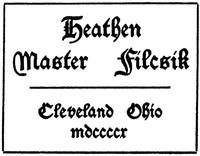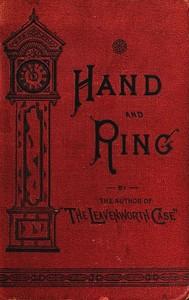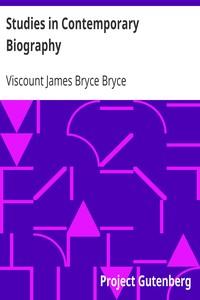Read this ebook for free! No credit card needed, absolutely nothing to pay.
Words: 118503 in 15 pages
This is an ebook sharing website. You can read the uploaded ebooks for free here. No credit cards needed, nothing to pay. If you want to own a digital copy of the ebook, or want to read offline with your favorite ebook-reader, then you can choose to buy and download the ebook.
to treat as autobiographical, though some of his critics have done so, the picture of Vivian Grey. What that singular book shows is that, at an age when his contemporaries were lads at college, absorbed in cricket matches or Latin verse-making, Disraeli had already meditated profoundly on the conditions and methods of worldly success, had rejected the allurements of pleasure and the attractions of literature, as well as the ideal life of philosophy, had conceived of a character isolated, ambitious, intense, resolute, untrammelled by scruples, who moulds men to his purposes by the sheer force of his intellect, humouring their foibles, using their weaknesses, and luring them into his chosen path by the bait of self-interest.
To lay stress on the fact that Mr. Disraeli was of Hebrew birth is not, though some of his political antagonists stooped so to use it, to cast any reproach upon him: it is only to note a fact of the utmost importance for a proper comprehension of his position. The Jews were at the beginning of the nineteenth century still foreigners in England, not only on account of their religion, with its mass of ancient rites and usages, but also because they were filled with the memory of centuries of persecution, and perceived that in some parts of Europe the old spirit of hatred had not died out. The antiquity of their race, their sense of its long-suffering and isolation, their pride in the intellectual achievements of those ancestors whose blood, not largely mixed with that of any other race, flows in their veins, lead the stronger or more reflective spirits to revenge themselves by a kind of scorn upon the upstart Western peoples among whom their lot is cast. The mockery one finds in Heinrich Heine could not have come from a Teuton. Even while imitating, as the wealthier of them have latterly begun to imitate, the manners and luxury of those nominal Christians among whom they live, they retain their feeling of detachment, and are apt to regard with a coldly observant curiosity the beliefs, prejudices, enthusiasms of the nations of Europe. The same passionate intensity which makes the grandeur of the ancient Hebrew literature still lives among them, though often narrowed by ages of oppression, and gives them the peculiar effectiveness that comes from turning all the powers of the mind, imaginative as well as reasoning, into a single channel, be that channel what it may. They produce, in proportion to their numbers, an unusually large number of able and successful men, as any one may prove by recounting the eminent Jews of the last seventy years. This success has most often been won in practical life, in commerce, or at the bar, or in the press ; yet often also in the higher walks of literature or science, less frequently in art, most frequently in music.
Mr. Disraeli had three of these characteristics of his race in full measure--detachment, intensity, the passion for material success. Nature gave him a resolute will, a keen and precociously active intellect, a vehement individuality; that is to say, a consciousness of his own powers, and a determination to make them recognised by his fellows. In some men, the passion to succeed is clogged by the fear of failure; in others, the sense of their greatness is self-sufficing and indisposes them to effort. But with him ambition spurred self-confidence, and self-confidence justified ambition. He grew up in a cultivated home, familiar not only with books but with the brightest and most polished men and women of the day, whose conversation sharpened his wits almost from childhood. No religious influences worked upon him, for his father had ceased to be a Jew in faith without becoming even nominally a Christian, and there is little in his writings to show that he had ever felt anything more than an imaginative, or what may be called an historical, interest in religion. Thus his development was purely intellectual. The society he moved in was a society of men and women of the world--witty, superficial in its interests, without seriousness or reverence. He felt himself no Englishman, and watched English life and politics as a student of natural history might watch the habits of bees or ants. English society was then, and perhaps is still, more complex, more full of inconsistencies, of contrasts between theory and practice, between appearances and realities, than that of any other country. Nowhere so much limitation of view among the fashionable, so much pharisaism among the respectable, so much vulgarity among the rich, mixed with so much real earnestness, benevolence, and good sense; nowhere, therefore, so much to seem merely ridiculous to one who looked at it from without, wanting the sympathy which comes from the love of mankind, or even from the love of one's country. It was natural for a young man with Disraeli's gifts to mock at what he saw. But he would not sit still in mere contempt. The thirst for power and fame gave him no rest. He must gain what he saw every one around him struggling for. He must triumph over these people whose follies amused him; and the sense that he perceived and could use their follies would add zest to his triumph. He might have been a great satirist; he resolved to become a great statesman. For such a career, his Hebrew detachment gave him some eminent advantages. It enabled him to take a cooler and more scientific view of the social and political phenomena he had to deal with. He was not led astray by party cries. He did not share vulgar prejudices. He calculated the forces at work as an engineer calculates the strength of his materials, the strain they have to bear from the wind, and the weights they must support. And what he had to plan was not the success of a cause, which might depend on a thousand things out of his ken, but his own success, a simpler matter.
A still greater source of strength lay in his Hebrew intensity. It would have pleased him, so full of pride in the pure blood of his race, to attribute to that purity the singular power of concentration which the Jews undoubtedly possess. They have the faculty of throwing the whole stress of their natures into the pursuit of one object, fixing their eyes on it alone, sacrificing to it other desires, clinging to it even when it seems unattainable. Disraeli was only twenty-eight when he made his first attempt to enter the House of Commons. Four repulses did not discourage him, though his means were but scanty to support such contests; and the fifth time he succeeded. When his first speech in Parliament had been received with laughter, and politicians were congratulating themselves that this adventurer had found his level, he calmly told them that he had always ended by succeeding in whatever he attempted, and that he would succeed in this too. He received no help from his own side, who regarded him with suspicion, but forced himself into prominence, and at last to leadership, by his complete superiority to rebuffs. Through the long years in which he had to make head against a majority in the House of Commons, he never seemed disheartened by his repeated defeats, never relaxed the vigilance with which he watched his adversaries, never indulged himself by staying away from Parliament, even when business was slack; never missed an opportunity for exposing a blunder of his adversaries, or commending the good service of one of his own followers. The same curious tenacity was apparent in his ideas. Before he was twenty-two years of age he had, under the inspiration of Bolingbroke, excogitated a theory of the Constitution of England, of the way England should be governed at home and her policy directed abroad, from which he hardly swerved through all his later life. Often as he was accused of inconsistency, he probably believed himself to be, and in a sense he was, substantially faithful, I will not say to the same doctrines, but to the same notions or tendencies; and one could discover from the phrases he employed how he fancied himself to be really following out these old notions, even when his conduct seemed opposed to the traditions of his party. The weakness of intense minds is their tendency to narrowness, and this weakness was in so far his that, while always ready for new expedients, he was not accessible to new ideas. Indeed, the old ideas were too much a part of himself, stamped with his own individuality, to be forsaken or even varied. He did not love knowledge, nor enjoy speculation for its own sake; he valued views as they pleased his imagination or as they carried practical results with them; and having framed his theory once for all and worked steadily upon its lines, he was not the man to admit that it had been defective, and to set himself in later life to repair it. His pride was involved in proving it correct by applying it.
With this resolute concentration of purpose there went an undaunted courage--a quality less rare among English statesmen, but eminently laudable in him, because for great part of his career he had no family or party connections to back him up, but was obliged to face the world with nothing but his own self-confidence. So far from seeking to conceal his Jewish origin, he displayed his pride in it, and refused all support to the efforts which the Tory party made to maintain the exclusion of Jews from Parliament. Nobody showed more self-possession and more perfect self-command in the hot strife of Parliament than this suspected stranger. His opponents learnt to fear one who never feared for himself; his followers knew that their chief would not fail them in the hour of danger. His very face and bearing had in them an impassive calmness which magnetised those who watched him. He liked to surround himself with mystery, to pose as remote, majestic, self-centred, to appear above the need of a confidant. He would sit for hours on his bench in the House of Commons, listening with eyes half-shut to furious assaults on himself and his policy, not showing by the movement of a muscle that he had felt a wound; and when he rose to reply would discharge his sarcasms with an air of easy coolness. That this indifference was sometimes simulated appeared by the resentment he showed afterwards.
This defence will not surprise any one who is familiar with Disraeli's earlier novels. These stories are as far as possible from being immoral; that is to say, there is nothing in them unbecoming or corrupting. Friendship, patriotism, love, are all recognised as powerful and worthy motives of conduct. That which is wanting is the sense of right and wrong. His personages have for certain purposes the conventional sense of honour, though seldom a fine sense, but they do not ask whether such and such a course is conformable to principle. They move in a world which is polished, agreeable, dignified, averse to baseness and vulgarity, but in which conscience and religion scarcely seem to exist. The men live for pleasure or fame, the women for pleasure or love.
Some allowance must, of course, be made for the circumstances of Disraeli's position and early training. He was brought up neither a Jew nor a Christian. The elder people who took him by the hand when he entered life, people like Samuel Rogers and Lady Blessington, were not the people to give lessons in morality. Lord Lyndhurst, the first of his powerful political friends, and the man whose example most affected him, was, with all his splendid gifts, conspicuously wanting in political principle. Add to this the isolation in which the young man found himself, standing outside the common stream of English life, not sharing its sentiments, perceiving the hollowness of much that passed for virtue and patriotism, and it is easy to understand how he should have been as perfect a cynic at twenty-five as their experience of the world makes many at sixty. If he had loved truth or mankind, he might have quickly worked through his youthful cynicism. But pride and ambition, the pride of race and the pride of genius, left no room for these sentiments. Nor was his cynicism the fruit merely of a keen and sceptical intelligence. It came from a cold heart.
His mental powers were singularly well suited to the rest of his character--were, so to speak, all of a piece with it. One sometimes sees intellects which are out of keeping with the active or emotional parts of the man. One sees persons whose thought is vigorous, clear, comprehensive, while their conduct is timid; or a comparatively narrow intelligence joined to an enterprising spirit; or a sober, reflective, sceptical turn of mind yoked to an ardent and impulsive temperament. What we call the follies of the wise often spring from some such source. Not so with him. His intelligence had the same boldness, intensity, concentration, directness, which we discover in the rest of the man. It was just the right instrument, not perhaps for the normal career of a normal Englishman seeking political success, but for the particular kind of work Disraeli had planned to do; and this inner harmony was one of the chief causes of his success, as the want of it has caused the failure of so many gifted natures.
He could hardly be called a well-read man, nor were his intellectual interests numerous. His education had consisted mainly in promiscuous reading during boyhood and early youth. There are worse kinds of education for an active intelligence than to let it have the run of a large library. The wild browsings of youth, when curiosity is strong as hunger, stir the mind and give the memory some of the best food it ever gets. The weak point of such a method is that it does not teach accuracy nor the art of systematic study. In middle life natural indolence and his political occupations had kept Disraeli from filling up the gaps in his knowledge, while, in conversation, what he liked best was persiflage. He was, however, tolerably familiar with the ancient classics, and with modern English and French literature; enjoyed Quintilian and Lucian, preferred Sophocles to AEschylus and Horace to Virgil, despised Browning, considered Tennyson the best of contemporary poets, but "not a poet of a high order." Physical science seems never to have attracted him. Political economy he hated and mocked at almost as heartily as did Carlyle. People have measured his knowledge of history and geography by observing that he placed the Crucifixion in the lifetime of Augustus, and thought, down till 1878, when he had to make a speech about Afghanistan, that the Andes were the highest mountains in the world. But geography is a subject which a man of affairs does not think of reading up in later life: he is content if he can get information when he needs it. There are some bits of metaphysics and some historical allusions scattered over his novels, but these are mostly slight or superficial. He amused himself and the public by now and then propounding doctrines on agricultural matters, but would not appear to have mastered either husbandry or any other economical or commercial subject. Such things were not in his way. He had been so little in office as not to have been forced to apply himself to them, while the tide of pure intellectual curiosity had long since ebbed.
If his intellect was not of wide range, it was within its range a weapon of the finest flexibility and temper. It was ingenious, ready, incisive. It detected in a moment the weak point, if not of an argument, yet of an attitude or of a character. Its imaginative quality made it often picturesque, sometimes even impressive. Disraeli had the artist's delight in a situation for its own sake, and what people censured as insincerity or frivolity was frequently only the zest which he felt in posing, not so much because there was anything to be gained, as because he realised his aptitude for improvising a new part in the drama which he always felt himself to be playing. The humour of the situation was too good to be wasted. Perhaps this love of merry mischief may have had something to do with his tendency to confer honours on those whom the world thought least deserving.
In inquiring how far the gifts I have sought to describe qualified Disraeli for practical statesmanship, it is well to distinguish the different kinds of capacity which an English politician needs to attain the highest place. They may be said to be four. He must be a debater. He must be a parliamentary tactician. He must understand the country. He must understand Europe. This last is, indeed, not always necessary; there have been moments when England, leaving Europe to itself, may look to her own affairs only; but when the sky grows stormy over Europe, the want of knowledge which English statesmen sometimes evince may bode disaster.
An orator, in the highest sense of the word, Disraeli never was. He lacked ease and fluency. He had not Pitt's turn for the lucid exposition of complicated facts, nor for the conduct of a close argument. The sustained and fiery declamation of Fox was equally beyond his range. And least of all had he that truest index of eloquence, the power of touching the emotions. He could not make his hearers weep. But he could make them laugh; he could put them in good-humour with themselves; he could dazzle them with rhetoric; he could pour upon an opponent streams of ridicule more effective than the hottest indignation. When he sought to be profound or solemn, he was usually heavy and laboured--the sublimity often false, the diction often stilted. For wealth of thought or splendour of language his speeches will not bear to be compared--I will not say with those of Burke , but with those of three or four of his own contemporaries. Even within his own party, Lord Derby, Lord Ellenborough, and Lord Cairns in their several ways surpassed him. There is not one of his longer and more finished harangues which can be read with interest from beginning to end. But there is hardly any among them which does not contain some striking passage, some image or epigram, or burst of sarcasm, which must have been exceedingly effective when delivered. It is partly upon these isolated passages, especially the sarcastic ones , and still more upon the aptness of the speech to the circumstances under which it was made, that his parliamentary fame rests. If he was not a great orator he was a superb debater, who watched with the utmost care the temper of the audience, and said just what was needed at the moment to disconcert an opponent or to put heart into his friends. His repartees were often happy, and must sometimes have been unpremeditated. As he had not the ardent temperament of the born orator, so neither had he the external advantages which count for much before large assemblies. His voice was not remarkable either for range or for quality. His manner was somewhat stiff, his gestures few, his countenance inexpressive. Yet his delivery was not wanting in skill, and often added point, by its cool unconcern, to a stinging epigram.
Free books android app tbrJar TBR JAR Read Free books online gutenberg
More posts by @FreeBooks

: Heathen Master Filcsik by Miksz Th K Lm N Loew William N William Noah Translator - Hungarian fiction Translations into English










